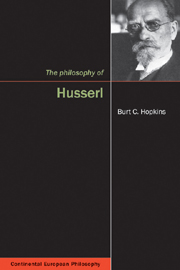Book contents
- Frontmatter
- Contents
- Acknowledgements
- Abbreviations
- Prolegomenon: Husserl's turn to history and pure phenomenology
- I Plato's and Aristotle's theory of eidē
- II From descriptive psychology to transcendentally pure phenomenology
- III From the phenomenology of transcendental consciousness to that of monadological intersubjectivity
- IV From monadological intersubjectivity to the historical a priori constitutive of all meaning
- 11 The pure phenomenological motivation of Husserl's turn to history
- 12 The essential connection between intentional history and actual history
- 13 The historicity of both the intelligibility of ideal meanings and the possibility of actual history
- 14 Desedimentation and the link between intentional history and the constitution of a historical tradition
- 15 Transcendental phenomenology as the only true explanation of objectivity and all meaningful problems in previous philosophy
- V The unwarranted historical presuppositions guiding the fundamental ontological and deconstructive criticisms of transcendental philosophy
- Epilogue: Transcendental-phenomenological criticism of the criticism of phenomenological cognition
- Coda: Phenomenological self-responsibility and the singularity of transcendental philosophy
- Notes
- Bibliography
- Index
12 - The essential connection between intentional history and actual history
from IV - From monadological intersubjectivity to the historical a priori constitutive of all meaning
- Frontmatter
- Contents
- Acknowledgements
- Abbreviations
- Prolegomenon: Husserl's turn to history and pure phenomenology
- I Plato's and Aristotle's theory of eidē
- II From descriptive psychology to transcendentally pure phenomenology
- III From the phenomenology of transcendental consciousness to that of monadological intersubjectivity
- IV From monadological intersubjectivity to the historical a priori constitutive of all meaning
- 11 The pure phenomenological motivation of Husserl's turn to history
- 12 The essential connection between intentional history and actual history
- 13 The historicity of both the intelligibility of ideal meanings and the possibility of actual history
- 14 Desedimentation and the link between intentional history and the constitution of a historical tradition
- 15 Transcendental phenomenology as the only true explanation of objectivity and all meaningful problems in previous philosophy
- V The unwarranted historical presuppositions guiding the fundamental ontological and deconstructive criticisms of transcendental philosophy
- Epilogue: Transcendental-phenomenological criticism of the criticism of phenomenological cognition
- Coda: Phenomenological self-responsibility and the singularity of transcendental philosophy
- Notes
- Bibliography
- Index
Summary
The two limits of the investigation of the temporal genesis proper to the intentional object
Husserl's account of how the eidetic possibility of an object's intentional unity contains the sedimented history of its own constitution is guided by two limits that are bound up with and therefore indicated by this possibility. These emerge in his critical analysis of the universal eidetic form of the intentional genesis of each such object's unity, that is, in the analysis of internal temporality. The first limit concerns the general substratum of consciousness that the continuous modification of the retentional consciousness approaches, and beyond which the “prominence [Abgehobenheit]” (CM, 80) of the object flows away. The second limit concerns the past history of the original presentation of the object itself. Both limits point to sedimented meanings that can be awakened such that the intentional genesis of the meaning in question is reproduced as the history of its constitution, a history that, of course, does not take place within natural time.
Two “histories”, then, are initially at issue in Husserl's phenomenological account of the eidetic possibility of an object's intentional unity. The first history concerns the possibility of such an object retaining its unity as an enduring “presence” once it has been presented to consciousness. This history concerns the object's intentional genesis as an objective prominence, its persistence throughout the temporality that is the essential characteristic of its (the object's) experience.
- Type
- Chapter
- Information
- The Philosophy of Husserl , pp. 181 - 186Publisher: Acumen PublishingPrint publication year: 2010

